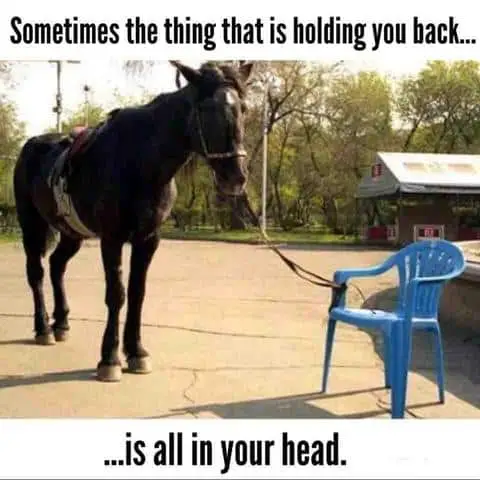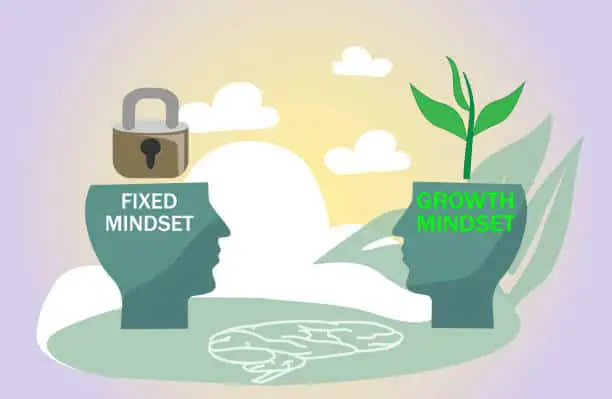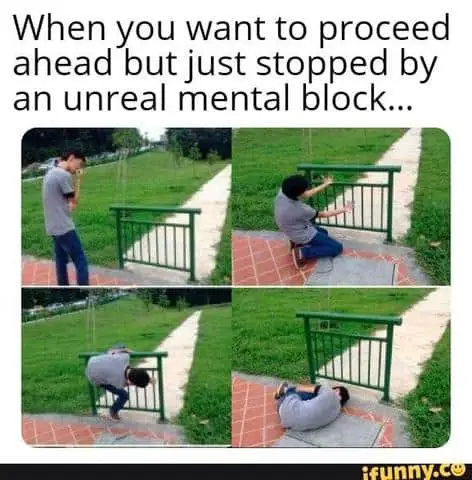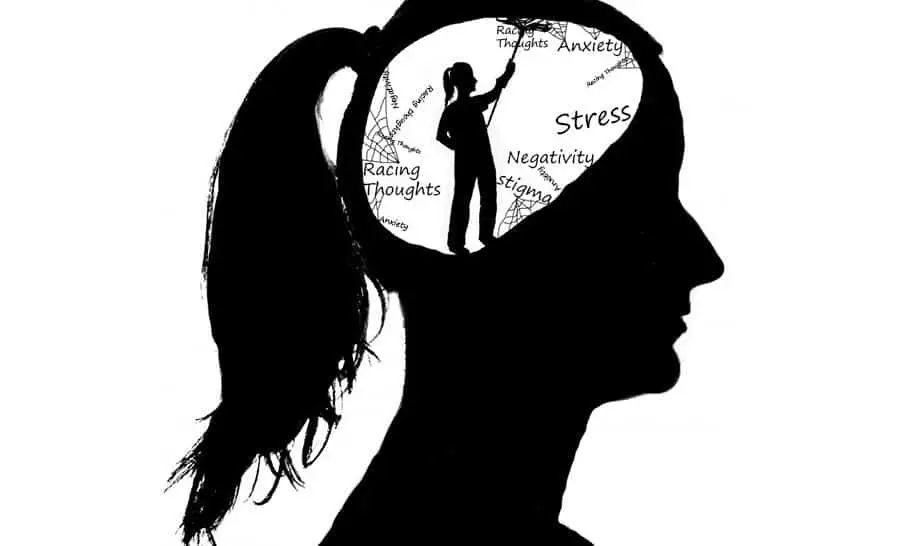Philosophical question: Can you see something if you don’t know whether it exists ?
The thing about having a mental block, is that you can’t always see if you have one. So the question is…, if you can’t see your own mental blockage, how do you know if you have one?
Experts agree, and based on my own personal experience, the best indicator is stress.
If you’re feeling high levels of stress or anxiety it doesn’t guarantee that you have a mental block, but it’s a good indicator. At some point in life, everyone reaches a plateau.
Doctors, psychologists, life-coaches, guru’s, and business professionals all agree that having a mental block (or feeling stuck in life), is actually more common than most people think.
Do you have a mental block?
Maybe even one that you’re not aware of ?
Speaking from experience, having a mental block can stop you from moving forward in life life which can create a feeling that can be incredibly frustrating. One stupid little block that prevents you from seeing something with true clarity can impact your professional life, your overall decision-making ability, and your personal life.
In this article we seek expert advice, perspectives, and opinions in order to get a better understanding for mental blocks, how to identify, and navigate around them.
What is a mental block, why does it happen, and how you can overcome a mental block ?
Let’s Dive In.
What Exactly Is a Mental Block – Explained
A mental block is a psychological (or emotional) barrier (or bias) standing in the way of your ability to see the reality in from of you clearly, rationally, and with-in the context of the ‘bigger picture‘.

The Founder and Medical Director for Sage Neuroscience Center,Dr. Reuben Sutter, believes a mental block is what happens when your brain reaches a psychological (or emotional) barrier which prevents you from accessing new levels of creativity, motivation, memory, or productivity.
If you have a mental block it’s common to feel anxious, frustrated, stressed, or depressed. Mental blocks often amplify problems and block solutions.
Other experts define a mental blockage as an unconscious suppression of thoughts or memories. Mental blocks can be caused by stress, traumatic experiences, or simply a lack of focus, or lack of experience.
In my own journey of life, I’ve found that psychological barriers have a way of inevitably popping up when you’re pushing yourself to new boundaries. For example, working on a big project, trying to plan ahead for a life-changing activity, or working towards a goal.
Mental blocks can leave you feeling stuck, frustrated, and stagnant. It’s especially frustrating if you’re unaware that you have a mental block. But once you identify a mental block, navigating around them becomes possible.
If you don’t identify a mental block, then frustration builds, followed by anger, stress, anxiety, wanting to quit everything in life, and feelings of depression. Yeah, I’ve been there a few times with my own mental blocks.
BUT, once you become aware that you’re experiencing a mental block. You then gain the advantage of being able to step back, breathe, find a new perspective, and navigate a new route around your blockage.
Here’s how to identify the most common types of mental blocks.
How Can You Identify If You Have Mental Block (10 tips)
A mental block does not have to be complex. It can be as simple as a slight mistake in your perception or perspective.
Identifying the mental block that could be holding you back from a tremendous breakthrough in life is vital if you want to rewrite your story (or at least propel it forward).

10 Symptoms of a Mental Block
- Worrying over a project’s outcome
- Being uncertain about your next steps
- Not being confident about your ability to deliver
- Anxiety when doing something for the first time
- Holding yourself back from an incredible opportunity
- Loss of appetite
- Lack of motivation
- Irritability
- Insomnia
- Stress-eating
Understanding And Identifying the 5 Most Common ‘Types‘ of Mental Blocks
1. Self-Doubt
The “I am not good enough” mindset makes you deny your most valuable ideas, strengths, or ambitions for fear that they are not good enough.
Don’t let the “i’m not good enough” mindset hold you back
2. Fixed Mindset
You make assumptions based on poor information which leads you nowhere.

It’s important to keep an open mind for new ideas, new perspectives, and new solutions. Even most experts don’t know everything, and even if they did, the world is constantly evolving.
Keep an open mind and try new things in order to continue yoru evolution with the rest of the world.
3. Indecision
This mental block is somewhat demoralizing and can rob you of your self-worth and esteem.
Wavering back and forth and overanalyzing on decision making.
This makes you feel so anxious and overwhelmed about a certain outcome so much so that you don’t put in enough effort to complete it.
Sometimes its best to “just pull the trigger” and live with the results. Keep it moving.
4. Comparison
This mental block makes you believe in success scarcity.
You believe that there are only a few opportunities, and thus, only a few successes available in the world.
It makes you feel threatened if someone succeeds before you do. Don’t compare yourself to other people’s success. Put in the work and your success will follow.
5. Having No Limits
Enthusiasm is great, but thinking that you can do many interests and endeavors while overestimating your resources and abilities leads to dead ends.
Having too many things going on at once leads to depression that can make you quit.
12 Potential Causes a Mental Block ?
Mental blocks or psychological blocks are usually caused by a lack of awareness.
It’s not always your fault, often we are just unaware that there’s a better way, a different way, or just ‘A way’ to achieve something.

In order to get over a mental block you need to develop a deeper understanding of the obstacle at hand.
but there are some factors that can contribute to a higher probability of having a mental block or being unaware.
1. Lack of Enough Sleep
Adults need at least 7-9 hours of uninterrupted rest for optimum brain rejuvenation.
According to Havard Health Letter, depriving yourself of sleep causes mind fogginess, affecting focus, mood, and productivity.
2. Medication
Mental block can be a side-effect of some drug prescriptions. This may also include over-the-counter treatment.
3. Poor Nutrition
Nutritional deficiency, especially a lack of vitamin B12, can cause memory lapse and depression that results in a mental block.
4. Overcommitting
Committing to more tasks than you can handle is mentally exhausting and counter-productive. Plus, the constant cognitive baggage can cause full-blown burnout.
5. Pessimism
If you think you have a mental block, try to find out your outlook in life. Do you tend to have a negative outlook, believe that there’s no chance to succeed, and feel unmotivated?
6. Procrastination and Avoidance
Procrastinating and putting off a task is more taxing for the brain. It must have happened to you at some point, like, no matter how hard you want to get work done, you just can’t stop yourself from flicking through social media mindlessly.
It increases the anxiety about whatever you are avoiding, depleting your mental energy in return, making it challenging to resume the project.

7. Perfectionism
Perfectionism is a double-edged sword. Overanalyzing, overthinking, and ensuring that you make an utter best choice even when it isn’t so mandatory can lead to decision-making paralysis.
8. Impostor Syndrome
You can get trapped by your own thinking and feeling that you are inadequate and incapable. This leads to the irrational fear of “what if people discover that I’m not the best person for the task? ”
You’ll focus on the fear of being exposed as an impostor that you may fail to focus on anything else.
9. Clutter
Surrounding yourself with clutter triggers cortisol production (or stress hormones.) This includes your physical environment and headspace.
It creates stress that can cause mental fatigue and make developing a productive or creative mind frame hard.
10. Little Think
You don’t think big enough, stall at each progress, and procrastinate too much, making it hard to see a project to an end.
11. Decision Fatigue
Having to make too many emotional decisions can be so taxing that it can drain your executive function.
12. Fuzzy Focus
You can only make progress if you envision what you want in your mind. If you don’t compartmentalize your thought to find clarity, your imaginations will clutter. They’ll overwhelm you and cause a mental block.
7 Physical And Mental Effects You May Experience With a Mental Blockage
1. Serious Health Problems
Unaddressed mental blockage can cause medical issues like anxiety and burn-out.
2. Less Physical Endurance
Several adverse body effects can stem from mental blocks. It may rob you of mental readiness to perform, causing stress and anxiety.
For instance, if you are a sportsperson with a mental block, you will have harmful thoughts like “my brain is stuck “ or “my body won’t move.”
Such thoughts may overtake your cognitive processing and impact your physical endurance or movements.
An unresolved mental blockage can cause you to develop an avoidance behavior, or worse still,
psychological distress.
3. Incidental Forgetting
Mental blocks can make you temporarily forget information, especially if you have fuzzy focus abilities.
If you don’t focus and categorize your ideas, you’ll clutter your headspace and get overwhelmed.
This will cause interference, which means that you’ll experience memory distortion due to the existence of too many related memories when retrieving information.
4. Lost Opportunities
Perfectionism and impostor syndrome can make you stay at one place for a long time and miss other excitable opportunities.
Wanting to be “so good” at one job may prevent you from seeking new ventures for fear of starting to develop your skills from scratch once again.
On the other hand, the irrational fear of “what if people find out I’m not the best fit for this job” will make pin you to one place where you believe people think you are best at.
5. Mediocre Work

Self-doubt, uncertainty, procrastination, and avoidance can create stress and anxiety that can get in the way of your creativity.
6. Less Confidence
We all know how shattered self-esteem can harm someone. It is worse if someone else shatters it but fatal if you shatter it yourself.
Mental blockage can rob you of your self-belief and motivation, making you feel and think “lesser” of yourself.
7. Derailed Sense of Contentment
Contentment is a choice. Feeding your own mental demons may prevent you from living a freer and more satisfying life.
For instance, mental blockage due to pessimism, stress, anxiety, or clutter prevents you from having a bespoke brain that can allow you to see life’s brilliance or how much you are evolving.
5 Tips To Help You Get Over a Mental Blockage
1. Take Control Over Your Mindset
Knowledge is power, so understanding, realizing, and acknowledging that you have a mental block is one step towards redemption.
Break down the possible reasons you think causes this state, whether it’s the fear for failure or “flight or fight” response and work on them.
2. Organize Your Headspace

Develop a state of mindfulness. Tap into your mind and filter what’s more important and ignore what’s not. Write down your ideas, feelings, fears, dreams, life lessons, and secrets.
Staring into your fears, secrets, and vulnerabilities on a piece of paper is powerful. Try to work on them to help you move past some of the things holding you back.
3. Focus on the “Now”
Stay present because you can’t always predict the future.
We are human, and we tend to envision disaster, develop imagination, and create a “safe place” that helps us avoid danger.
If it’s not the future, something about the past is preoccupying, crippling, and blocking your thinking.
You can gain some traction by getting hold of yourself and think about the present.
Staying present will help you find proactive problem-solving strategies.
4. Acknowledge Signs of a Breakthrough
Over-applying negatives about every aspect of our lives can trip us up. So, as you are working on getting over a mental block, identify some invisible positives in your tasks and life.
Notice what’s good about your efforts, even if you’ve reached the point of feeling fed up.
Identify with the mantra that “the more frustrating it gets, the closer your moment of breakthrough.” This is the only way to find the motivation to work and make.
5. Seek Out Failure
Use Your Fear Positively, especially if you are a perfectionist or have the imposter syndrome. We understand that your ego may bombard you with self-doubt over everything you do, but seek out failure.
Do this by moving so fast whenever you have a task. Create a volume of work that will not give you so much time for perfection. You may inevitably fail as many times than you succeed, but you’ll be helping to unblock your mind.
Conclusion: Mental Blockages
The best way to unblock our minds is by allowing ourselves to be vulnerable.
Let go of the protective ego and develop a habit of consciously releasing yourself from your fears and worries.
Disregard any truth you believe your fears hold and write your new truth.
No one can fully tame the mind, so continue fighting your mental block with courage, patience, and consistency.
Loved what you read?
Hit that share button and let the world in on the secret – we’d be thrilled!
Got thoughts? We’re all ears for your feedback, corrections, or a good old chat. Don’t be shy; drop us a line.
And hey, don’t miss out on our curated list of must-reads in the recommended books section.
Big thanks for diving in with us today!




